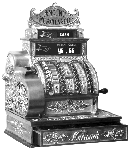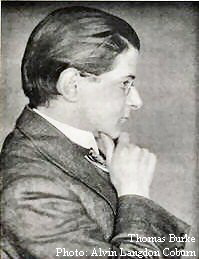|

© Copyright 1920 Thomas Burke Burke
Last week this person, desiring to make it known
That he was in all ways moving up to the date,
Introduced into his insignificant shop
A machine-that-counts,
Called a National Cash Register,
Which announces to refined and intelligent customers
The amounts of their purchases.
This week this person purchased a whole days' amusement;
And the amount he paid for this was another's discomfiture and pain.
And, after a night of cogitation,
He is moved to reflect on the far-reaching and wholesome value
Of a National Register which would announce to the face
The cost of such pleasures as this.
Thomas Burke
Thomas Burke (1887-1945) was a very good writer of the Edwardian and post-war eras. He wrote widely, penning 30 books, most of them about London. He was orphaned as a baby and spent his first nine years in Poplar, a working-class London borough near to Limestone and the Thames River docks. He was fascinated from a young age with the life of the East End streets and gained as much education from them as from formal schooling. His books reflected this fascination, concentrating on the East End of London and in particular Limehouse, where he was best friends with an elderly Chinese man who later became the model for Quong Lee. Burke's most memorable creation is the old Chinese sage Quong Lee, who originally appeared in a series of short stories as part of Burke's "Limehouse" series. These were later collected into The Song Book of Quong Lee of Limehouse (1920), More Limehouse Nights (1921), and The Pleasantries of Old Quong (1931). and post-war eras. He wrote widely, penning 30 books, most of them about London. He was orphaned as a baby and spent his first nine years in Poplar, a working-class London borough near to Limestone and the Thames River docks. He was fascinated from a young age with the life of the East End streets and gained as much education from them as from formal schooling. His books reflected this fascination, concentrating on the East End of London and in particular Limehouse, where he was best friends with an elderly Chinese man who later became the model for Quong Lee. Burke's most memorable creation is the old Chinese sage Quong Lee, who originally appeared in a series of short stories as part of Burke's "Limehouse" series. These were later collected into The Song Book of Quong Lee of Limehouse (1920), More Limehouse Nights (1921), and The Pleasantries of Old Quong (1931).
Source: The Song Book of Quong Lee
|

